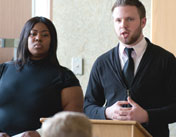Urban Collaborators: Making the Transition From Student to Practitioner
- Zenia Z. Kotval
- Professor, Urban Planning
- Director, Urban Collaborators
- School of Planning, Design, and Construction
- College of Social Science
- College of Agriculture and Natural Resources

Paige Seabrook and Paul Best present their "Feasibility Study for Blending Housing and Urban Agriculture."
For community organizations and local governments, navigating the bewildering array of land use, zoning, safety, building, health, economic, cultural, and other issues that may impact even the smallest neighborhood revitalization project can be difficult. Urban Collaborators, a partnership funded by the Office of the Provost, MSU Extension, and the School of Planning, Design, and Construction (SPDC), brings together MSU faculty and students with community-based Extension educators to assist the process of planning, evaluating, and capacity building.
This partnership not only brings University expertise to bear on community issues; it also provides an opportunity for MSU faculty investigators to identify new areas of research, test practical applications of theoretical knowledge, and share information with field professionals. In addition to mini-grants for capacity building and summer internships, Urban Collaborators also sponsors a Planning Practicum course that offers MSU students a way to make the connection between classroom instruction and its application to real-life challenges.
"Urban Collaborators and its planning partnerships give faculty and students a constant stream of ideas for collaborative research on 'real-world' problems."
Zenia Z. Kotval
Dr. Zenia Kotval weaves all of these considerations into what she calls "a smooth transition, where research, teaching, and outreach all cycle around each other," in the practicum class she co-teaches with Dr. Rex LaMore, director of MSU's Center for Community and Economic Development.
The Urban Planning Practicum is designed as both an academic course and an outreach initiative of SPDC. The capstone course pairs final-semester students (both undergraduate and post-baccalaureate) with Extension educators and working practitioners to conduct a planning and evaluation study for a community client.
"We work primarily with about six core communities," said Kotval. "But any city in Michigan can request a project. The proposals usually come in through our MSUE partners. While these studies are highly subsidized by the program, we do ask the clients for a small fee, usually about $2,500 when an Extension field educator is involved, so they have a financial stake in the project. The money goes toward expenses such as the students' travel, data sets, copying and so on. We may waive or reduce the fee on occasion."
The students design and carry out the work themselves. Each team of about half a dozen students works with a community organization, business, or local government authority to define the scope of the project, assess needs and opportunities, develop a plan, write a report, and present their findings to the client—an experience that is "essential for the progression of student to practitioner," said Kotval. The Extension educators act as instructors and mediators in the field.
"I learned more in this one semester than I did in my two years of graduate study."
Participating Student
"This is induction by fire! Surviving Practicum builds great confidence."
Participating Student
The process can be bumpy. Occasionally there is a mismatch among the needs of the client, the educational goals of the course, and the expertise of program faculty and students. "The faculty member may have a defined research agenda that doesn't have much room for compromise. Or the client may be better served by a discipline other than urban planning," said Kotval. "Expectations can be unrealistic on both sides."
For Kotval, the key to success is pinpointing the right scope of work. "Some projects are bigger than students can or should undertake," she said. "But for the right size project, we do very well. We accomplish a lot with a little." She pointed with pride to a study of neighborhood typologies and resident opinions about various revitalization options that her students completed for the City of Lansing in 2007: "We did it on a shoestring. A comparable city paid a consultant about $200,000 for theirs. And I think our study was better."
The "smooth transition" comes full circle with the many scholarly publications, presentations, and training materials that have resulted as Kotval reports back to the academic community about the partnership model and its evolution. Urban Collaborators and its planning partnerships give faculty and students a constant stream of ideas for collaborative research on 'real-world' problems," she said. "Most of my work is applied. I've been doing this for 15 years and I am still passionate about it."
What clients of urban planning partnerships are saying...
Kent County Weatherization Assistance Program
"Thanks to students, staff, and Carol Townsend, of Extension Kent County office. This is a large collaboration. We had to really come together to address utility problems. The students did a great job and made a presentation to the board that will help us in our next step as we move ahead with our community groups. Outstanding."
Karen Tolan, Associate Director
Area Community Services Employment and Training Council
Greening Mid-Michigan Toolkit
"It's been a pleasure working with the team. They're a hardworking and talented group. Their presentation to Ingham County Parks Commission resulted in a resolution of support for their recommendations. This was my first time as a client. I look forward to doing it again."
Harmony Gmazel, Land Use Planner
Tri-County Regional Planning Commission
Blissfest Music Organization Tourism and Renewable Energy Feasibility
"We knew this would be valuable but we had no idea how valuable. We have used some of your preliminary ideas already. So thank you very much for the thoroughness of your project."
Dale Hull, Consultant
Blissfest Music Organization
- Written by Linda Chapel Jackson, University Outreach and Engagement